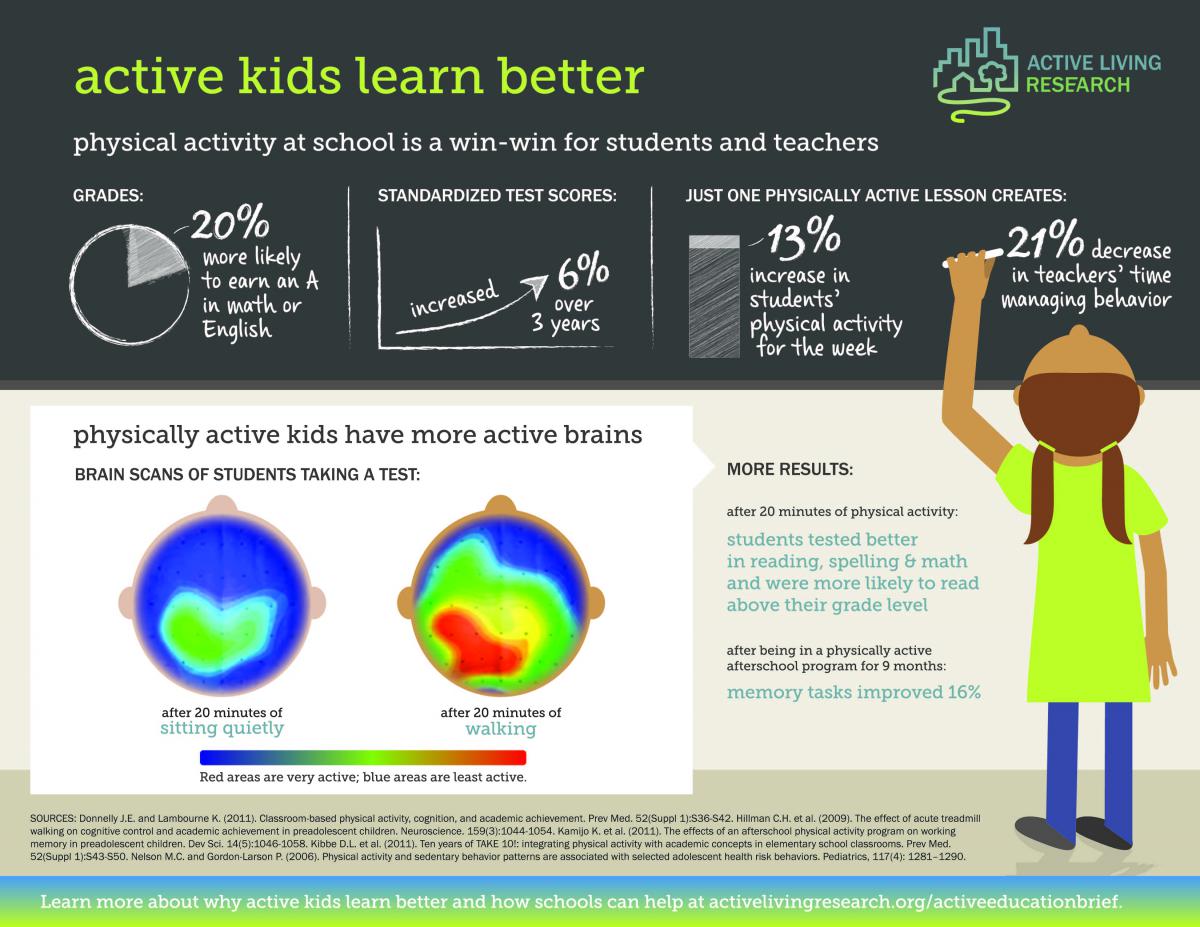There is a growing body of evidence showing a positive relationship between physical activity and measures of academic achievement, including grade point average (Kontomaa et al, 2013), rate of learning (Hillman et al., 2009), and classroom behavior (Davis and Cooper, 2011), as well as cognitive, social, and motor skill development and ability (Active Living Research, 2015).
Physical activity has demonstrated both short-term improvements to attention and memory, as well as long-term benefits for brain health (Active Living Research, 2015). Meanwhile, research suggests that overweight and obesity may be connected with lower academic performance (Kamijo et al., 2012) and greater risk for school absenteeism (Geier et al., 2007). More study is needed to explain the causal relationships between fitness, physical activity, body weight, and academics, but the connections are evident.
Safe Routes to School programs are an important complement to physical education and active learning during the school day to help students achieve national guidelines of 60 minutes of moderate-to-vigorous physical activity daily for children. The school setting is key for shaping opportunities for physical health and promoting health because children spend up to seven hours a day at school. However, school physical education alone will not achieve recommended amounts of daily physical activity among children (National Institutes of Medicine, 2013). A “whole of school” approach that encourages physical activity through active transport to school, such as Safe Routes to School programs, is beneficial (National Research Council, 2013). Yet, fewer than 10% of school districts nationwide include language promoting Safe Routes to School in their wellness policies (National Research Council, 2013). Articles in this section explore the relationships between fitness, physical activity, body weight, and academic performance.
Infographic: Active Living Research
Research Highlights:
- Aerobic fitness has been connected with better standardized test performance (Roberts, Freed, and McCarthy, 2010).
- Cardiorespiratory fitness and weight status have been independently connected with academic achievement, cognition, and behavior (Sardinha et al., 2014; Davis and Cooper, 2011).
- Children with a high level of fitness performed better on a test of memory than children with low levels of fitness (Raine et al., 2013).
- Higher body mass has been associated with lower academic achievement (Kamijo et al., 2013). Meanwhile, students with a healthier body mass index and cardiovascular fitness have higher academic achievement (Janak et al., 2014).
- In one study of middle schoolers, students who were not overweight had 25% fewer absences and 39% lower tardiness compared with students who were overweight (Shore et al., 2008).
- After adding physical activity to school curriculum, students performed 6% better on standardized tests than peers learning the same material in seated, inactive sessions (Donnelly and Lambourne, 2011).
- After 20 minutes of walking, students completed learning tasks more quickly and accurately and performed better on tests of reading comprehension (Hillman et al., 2009). Other studies have confirmed that 20 minutes of acute aerobic exercise, like walking, improve children’s cognitive performance (Drollette et al., 2014).
- An experimental study showed that students with intellectual and developmental disabilities had improved reaction time and brain activity following short bouts of cycling (Vogt et al., 2013).
- One study connected active commuting with higher cognitive performance on verbal, reasoning, and numerical tests among adolescent girls (Martinez-Gomez, 2011).
- Physical inactivity is more prevalent among lower-income youth and youth of color, which may negatively affect academic achievement, and active transportation can be an important strategy for increasing physical activity in this population (Basch, 2011).
- Schools serving adolescents from families of lower income should implement brief sessions of aerobic exercise during the school day, as just 12 minutes of aerobic exercise improved adolescents’ selective visual attention and reading comprehension abilities (Tine, 2014).
- Regular physical activity and higher levels of physical fitness have been linked to improved academic performance and brain function. Single sessions of physical activity can enhance attention and memory (Castelli et al., 2015).
- Physical activity is positively associated with cognition, but more research is needed on the role of sex, type and intensity of physical activity, and psychological variables (i.e., self-esteem, depression) (Esteban-Cornejo et al., 2014).
- Achieving adequate physical activity and maintaining aerobic fitness in childhood is critical to improve cognitive and brain development in adolescence (Khan et al., 2014).


